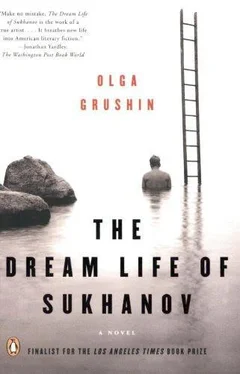It appeared that he had slept for some hours, for it was suddenly late in the evening. The moon drifted brilliantly through the dining room windows as he walked past, and Nina and Dalevich, entering with the effortless laughter of two old friends, surprised him by saying they would not be joining him for supper as they had eaten already, in some nameless cafeteria upon which they had stumbled after their visit to the museum. It hardly mattered, for he did not feel in the least bit hungry, and his body still rang with an overwhelming desire for rest. Nodding agreeably, without listening (Dalevich, as usual, was trying to talk to him about some article he had written), he swam through the thickening air back to the study and, undressing this time, slipped under the blankets and fell asleep once again.
He continued to dream outlandish, not to say disturbing, dreams. Sometime in the middle of the night, he heard dogs barking incessantly in the streets. Their howling soon grew so hoarse and strained, nearly rabid with excitement, that he got up, passed through the sleeping house, and, with a presence of mind unnatural in a dream, found a coat to throw over his pajamas and some shoes in which to deposit his feet, then descended in the elevator (which was there this time), crossed the deserted, moonswept lobby, and expecting the unexpected, stepped outside. In the coolness of the August night, the mysterious woman with the exquisitely drawn features of Nefertiti was drifting aimlessly along the pavements of Belinsky Street, dressed in a diaphanous wedding gown, a pack of maddened homeless dogs following at her dainty satin heels. At his approach, she lifted her lovely, tear-stained face toward him, and said simply and sadly, “He’ll never marry me, I know it. He tells me he will, but he won’t. I understand now. He has a wife and a daughter. He is a very important man—a minister, no less. I understand.”
As she spoke, a delicate vein pulsated in her throat, her mouth was pale and pained like a wilting petal, her eyes glistened like melting, rain-washed gems, and, bright like her eyes, two diamond cascades flowed from her ears. He stared at her with a freedom allowed only in dreams. Behind him, as if mesmerized, the dogs too ceased their barking one after another and, watching her, carefully bared their teeth, dripping saliva onto her trailing gauze train. She said nothing more, only stood there, her piano player’s hands poised in an attitude of grieving supplication—and the whole world lay still and silent around them, like a starry sky’s reflection in the dark waters of an abandoned pond, like a particle of time frozen for all eternity in a marvelous painting, and it was frightening and heartbreaking and beautiful, this strange encounter, woven whole as it was from the moonlit, elusive fabric of the night….
It ended, as dreams must, with hasty, unbecoming absurdity. Unwinding a checkered woolen scarf left in the sleeve of his coat from some previous winter’s dream, Sukhanov tossed it at the dogs in a gesture that was of course futile yet perfectly sensible at the moment, and immediately, forgetting all about them, the pack fell onto the scarf, snarling, tearing, fighting over it. Grabbing her by the elbow, he dragged her inside, and through the echoing lobby, and up a few flights of stairs, to deliver her, slightly out of breath but unresisting, to the door of apartment number five, which he found standing wide open.
“He’ll marry you, don’t worry,” he said generously and insin cerely, as he gave her a gentle push across the threshold. “He’d be a fool not to.”
The last thing he remembered before mounting the stairs to his own eighth floor was the sight of her face, white and streaked with two grooves of running mascara, like a tragic Venetian porcelain mask, floating above a sea of silk and lace and sparkling with diamonds, lifted toward him from the dark cave of the gaping doorway.
After that, his duty performed, Sukhanov’s dream self returned to the couch (in passing hanging the ghostly coat on its hook and removing the nonexistent shoes) and fell into an even deeper slumber. Sometime shortly after dawn he had another dream, not full of melancholy wonder this time, but domestic and simple, containing a promise of happiness like a seed inside its warm soil. Nina, coming into his study on tiptoes, dressed in an old pair of slacks and a faded sweater with a thick, unfeminine collar, which made her look every day of her age and so familiar, so dear, bent over him briefly to drop a light kiss onto his cheek.
“I was hoping to talk to you last night,” she whispered, “but you went to sleep so early, and now I have a seven-thirty train to catch.”
“But where are you going?” he asked tenderly, smiling at the kiss in his sleep.
“To the dacha,” she said. “It may not have rained there. I need to check on the roses.”
“Ah yes, the roses, of course, beds and carpets and fields of roses,” said the dream Sukhanov. “But you’ll be back, my love?”
“I’ll be back,” the dream Nina promised softly. “In a few days.”
“The roses,” he said again, and nodding joyfully, began to sail away, only opening his eyes for an instant to see Nina’s hand hovering over his forehead before descending in a final, swift caress—but by then, he had already been washed onto new, unfamiliar shores.
But didn’t she tell you?” Dalevich said, peering anxiously into Sukhanov’s face.
The morning was quiet and sunny, and a bird in a nearby tree repeated its bright little song over and over in a hollow imitation of pastoral happiness.
“Anyway, it’s only for a few days,” Dalevich added helpfully. “She just needs to water the flowers. She should be back by Tuesday at the latest.”
Sukhanov persisted in rubbing his glasses with the edge of the tablecloth, thinking of an important party to which he and Nina were invited this evening and to which he would now have to go alone. “Of course,” he finally murmured, starting to stand up.
“Listen, Tolya,” said Dalevich hastily, “we never finished our talk the other day, and there was something in particular I wanted to—”
“Of course,” said Sukhanov again. “Except that right now I have this article I must review. Urgent work, I’m sure you understand.”
“Oh, completely,” said Dalevich. “And as a matter of fact, I was just about to tell you—”
“Let’s talk at dinnertime, shall we, then?” Sukhanov said.
The bird continued to strain its throat with throbbing exuberance. As he trod the long corridor to his study, he felt his cousin’s eyes on his back.
He spent the rest of the morning behind the closed door, in a semidarkness of tightly drawn curtains, stubbornly warding off all thoughts of Nina’s desertion and poring over the Chagall article. It was, he had to admit, exceptionally well written. Instead of delivering a dutiful recital of dull biographical facts, D. M. Fyodorov (whoever the devil he was) had chosen to present the artist’s development through a series of defining encounters: a stuttering meeting of the chaperoned adolescent with a kindly Judel Pan, a pedestrian but endearing Vitebsk painter who would become Chagall’s first teacher and in whose studio the youth would struggle to draw plaster busts but lapse time and time again into unacceptable lilac colors; an accidental introduction to Bella, daughter of a local jewelry merchant, in whose radiant black gaze his soul would find its eternal home; then, already in the capital, a timid, excited audience with the celebrated Leon Bakst, founder of the famous St. Petersburg art school, leader in the influential World of Art movement, and proud proclaimer of art for art’s sake, who to the young Chagall seemed the triumphant incarnation of all European traditions, but who, after a mere few months as his tutor, began to appear too stylized, too refined, and in the end too cold and foreign in Chagall’s eyes—too small for his expanding, deepening universe of pain and joy; and finally, completing his formation as an artist, a momentous meeting in pre—World War I Paris with Anatoly Vasilievich Lunacharsky—Lenin’s future mouthpiece on the subject of art in the service of the Revolution, and Bakst’s ideological negative—to whom Chagall politely showed his works and, noticing the man’s puzzlement, said serenely, “Just don’t ask me why everything on my canvases is blue or green, or why a calf is visible in a cow’s stomach. Let your Marx, if he is so smart, come back from the dead and explain everything to you.”
Читать дальше








![Theresa Cheung - The Dream Dictionary from A to Z [Revised edition] - The Ultimate A–Z to Interpret the Secrets of Your Dreams](/books/692092/theresa-cheung-the-dream-dictionary-from-a-to-z-r-thumb.webp)



